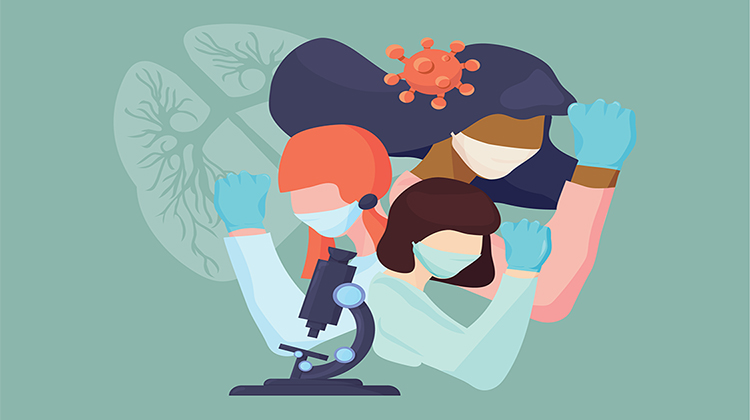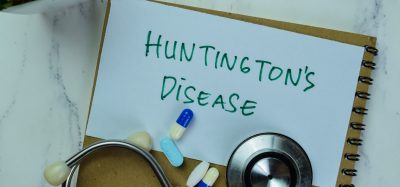Women in Stem with Andrea Pfeifer
Posted: 30 November 2023 | Dr Andrea Pfeifer (AC Immune SA) | No comments yet
This November edition of our Women in Stem series spotlights Andrea Pfeifer, CEO and Co-Founder of AC Immune SA. Dr Andrea Pfeifer co-founded AC Immune SA in 2003, since when she has served as a Director on the Board, successfully leading it to an IPO in 2016. Under her leadership, multiple transformative partnerships have been established with leading pharmaceutical companies. Before founding the Company, she was the Head of Nestlé Research Centre in Lausanne, Switzerland where she played a major role in connecting science and business. Whilst at Nestlé she led the scientific development of a number of highly innovative, critically acclaimed products from laboratory to market, established the microbiome as a major cross-category product development platform and co-founded the Life Science focused Nestlé Venture Capital Fund.

Can you tell us about your journey in the field of STEM and the challenges you encountered along the way?
I’ve been involved in STEM for my entire academic and professional career. From an early age, I’ve been passionate about finding cures for difficult-to-treat diseases. After earning a PhD in toxicology from the University of Würzburg in Germany, I started my professional career as a cancer research scientist in the Human Carcinogenesis branch of the National Cancer Institute (USA). Experiencing a rigorous academic environment on both sides of the Atlantic set the foundations for a work ethic that continues to this day. Having to write multiple grant proposals as well as keeping up with publishing my research helped keep me on track toward my goals. On my return to Europe, I took a position at Nestlé as Head of the Research Centre, where I led the scientific development of several highly innovative health promoting food products from laboratory to market. Then I was approached to co-found AC Immune in 2003. I accepted and I’ve been CEO ever since; our goal, from the beginning, was to pioneer new ways to diagnose, treat and prevent neurodegenerative diseases.
My family and friends said I was crazy to take this step. It was a big risk, and it took courage on all our parts. With my new colleagues, we addressed the problems and challenges, we kept working on them until we found solutions.
What inspired you to pursue a career in STEM, and how did you overcome any obstacles or biases you may have faced?
My interest in STEM comes from an early age. Unfortunately, family members were chronically ill and I desperately wanted to help, to make things better. And, when I started my career, as a woman, I sometimes felt like an outsider! Far too often in my career, I have been the only woman in a meeting, and it is not always an easy situation. Some men can ignore or try and talk over you; women need to have the confidence to stand up to that and make their voices heard. The situation has become much better today but there is still a long way to go. We must continue to push through the remaining resistance and achieve true equality.
I believe that many young women want to work in a place with a woman in charge – it’s a little easier to visualise your own success that way. Nobody is perfect but still I feel that showing what is possible and the many advantages female leadership can bring to an organization is a big responsibility. I hope what I do can positively influence the development of other women’s careers.
In general, and not speaking specifically about gender issues now, I think it is important to deal with problems the right way. When we have a setback, I allow myself to take a step back and reflect for a few days. I always make an effort to remember that setbacks ultimately are opportunities and are key moments in the lives of most companies. Such challenges inspire and require leadership, resilience and encouragement to establish a clear plan to move forward. It is not the problem that defines us but rather the way we react to it. By learning and adapting while being persistent is what ultimately leads to success – often by a different route than the one imagined.
Could you share an example of a specific project or research that you have worked on and the impact it has had in your field?
By now, I have been involved in so many exciting projects that it is difficult to single out just one. The field I work in, neurodegeneration, affects so many people. 55 million people alone suffer from dementia and this number is forecast to double every 20 years – that you feel almost every decision and project can have a significant impact. This is a slow, silent pandemic and we are obliged to address it as quickly and effectively as possible.
With that context, fresh in my mind is some news from this summer, when we – as in AC Immune – received Fast Track designation from the U.S. Food and Drug Administration for our Alzheimer’s vaccine candidate, ACI-24.060. We are currently investigating ACI-24.060 in a Phase 1b/2 study, which is also enrolling people with Down syndrome.
People with Down syndrome are an important addition to the clinical study. Too few people know that Alzheimer’s-like characteristics develop in more than 98 percent of people with Down syndrome over age 40. We are the only company in the world including this population in any Alzheimer’s drug trial, and we are very proud of this! At the same time I find it unacceptable that this community has been overlooked for so long.
COVID-19 has shown the revolutionary impact of vaccines. We can potentially also achieve a similar outcome in the field of neurodegeneration. Our investigational active immunisation therapies could potentially delay or perhaps even prevent the onset of clinical dementia symptoms. We – as a team – are very proud to be advancing these products, three of which are in mid- to late-stage clinical development. It is incredibly exciting to be involved in the development of something that holds the potential to make such a huge difference to the world.
How has your research in STEM contributed to advancements or improvements in your field, and what potential future applications or implications do you foresee based on your work?
The recent positive clinical data from two new Alzheimer’s disease treatments – lecanemab from Eisai and Biogen and donanemab from Eli Lilly – bring real hope to patients and families. These are truly important breakthroughs in the battle against dementia, marking the first time we have been able to slow this insidious form of neurodegeneration. At the same time, it is also a starting point. We were disappointed to see that the public debate quickly turned to questions about the magnitude of efficacy, or the challenges of safety associated with these drugs. That’s missing the point – we have learned how to slow the disease. Just like in cancer, the next decade will see an acceleration with the last pieces of the puzzle falling into place – many new and incrementally more effective therapies are on the horizon. The field will quickly move to prevention strategies because by the time symptomatic patients are treated, much of the damage – irreversible destruction of neurons – has already been done.
Alzheimer’s disease is a complex, multifactorial disease and neuroscientists agree that we need a precision medicine approach to address the complexity. The first signs of cognitive decline appear after the disease has been present for several years. By then, many neurons have died, and cannot be replaced. The diagnosis and treatment of neurodegenerative diseases are further complicated by the fact that during disease progression multiple pathological proteins interact, and their proportions vary from patient to patient. Newer diagnostic tools are going to allow us to detect the disease long before symptoms emerge. Preventive strategies like those in place for diabetes and cancer need to be developed and rolled out. This should start now, because existing therapies are most impactful in the early stages of disease and preventive therapies are only years from the market.
As a woman in STEM, what unique perspectives or strengths do you believe you bring to your work?
I have always been interested in healthcare and how the brain works, going back to my time at Nestlé and researching the impact of coffee on brain function, and even earlier. My fascination with the brain and the impact of neurodegeneration has really driven me to apply my scientific curiosity to create something in a space where until recently, no treatment was available. We also have different perspectives as women. If we look back at our traditional role as caregivers, I think that brings a new point of view in how we develop medicines with more of a focus on the point of view of patients and their experience. Having people involved from a variety of backgrounds – whether that be gender, nationality, ethnicity or anything else – will always provide a greater diversity of views. Debate, discussion and investigation are the core of what we do as scientists and the diversity of views and ideas will only enhance our work, if we allow it.
I also think my career experience, having to prove my abilities over and again as a woman, has provided a deep well of resilience and experience which fuels my determination to find solutions for neurodegeneration.
What advice would you give to young women who are considering a career in STEM but may be hesitant due to societal stereotypes or perceived challenges?
I would say, first and foremost, to believe in yourself. You have the talent, and the sector needs you and your important contributions. In 2021, I was honoured to receive the first SEF Women Award for CEO of the Year presented by the Swiss Economic Forum. I am immensely proud to be seen as an example for the many talented women in Switzerland who are making their way in business, and I also see that as a heavy responsibility. It is important for young women to see that it is possible to get to the top, and equally that businesses can take full advantage of this deep talent pool that is still not being tapped to its full extent. Today there are many more women in senior roles in STEM than there used to be, and we are all open to guide and mentor younger women who are coming into the sector or working their way up. We have faced many of the same obstacles you may come across, so don’t hesitate to seek us out and ask for advice. We will be glad to help in whatever way we can.
How do you see the representation of women in STEM changing over the years, and what further progress do you believe is needed?
There are certainly more women working in STEM fields now and in more senior roles, but it is still not enough. There is a huge talent pool, and we are not tapping it to the extent possible. It means that we are not making the same progress in developing treatments for patients that we could be. People from different backgrounds bring different experiences and points of view, and it is this diversity of knowledge and opinion that can often make the difference in pharmaceutical development. AC Immune is a very diverse company. About 60 percent of our employees are female and we have some 20 nationalities in a workforce of 150. Of course, it requires openness towards people from a very wide range of backgrounds – but learning to navigate that adds to our strength.
In your opinion, what can organisations and institutions do to create a more inclusive and supportive environment for women pursuing STEM careers?
This is still a structural issue. In short, there should be fewer obstacles for women to get to the top. Women should no longer have to choose between family and work. Companies and governments must ensure the appropriate flexibility to achieve balance – and for men as well.
Looking ahead, what exciting developments or advancements do you foresee in your field of STEM, and how do you envision your own research contributing to those future innovations?
Neurodegeneration has always been a fascinating field to be involved in, and it is hugely motivating to work on something that could impact so many people for the better. The recent positive news on treatments for Alzheimer’s is a huge shot in the arm for our field. We have worked for so many years for this and now we finally have clear signs of progress – and that also highlights how much more needs to be done to reach a comprehensive solution. As I’ve explained, our research at AC Immune takes a comprehensive approach to tackling neurodegeneration through personalized medicine and we have an important role to play in our common fight against these diseases.
Author Bio:
 Andrea Pfeifer
Andrea Pfeifer
CEO and Co-Founder, AC Immune
Dr Andrea Pfeifer co-founded AC Immune SA in 2003, since when she has served as a Director on the Board, successfully leading it to an IPO in 2016. Under her leadership, multiple transformative partnerships have been established with leading pharmaceutical companies, yielding a potential value of up to CHF 3.3 billion plus additional royalties. Before founding the Company, she was the Head of Nestlé Research Centre in Lausanne, Switzerland where she played a major role in connecting science and business. Whilst at Nestlé she led the scientific development of a number of highly innovative, critically acclaimed products from laboratory to market, established the microbiome as a major cross-category product development platform and co-founded the Life Science focused Nestlé Venture Capital Fund. Prior to this she was a Visiting Fellow at the Human Carcinogenesis Branch of The National Institute of Health, Bethesda, USA.
She currently serves as the Chair of Investment Fund BioMedInvest, Basel and the drug discovery and development company AB2 Bio SA, Lausanne, and is a member of the Supervisory Board of Symrise AG, Holzminden, Germany. She is also a key member of the CEOi initiative on Alzheimer’s Disease and the Davos Alzheimer’s Collaborative (DAC). In 2021, she was awarded the first SEF.WomenAward for CEO of the Year by the Swiss Economic Forum. In 2022, she received the Aenne Burda Award for Creative Leadership, recognizing her pioneering work in the field of neurodegenerative diseases.
Dr Pfeifer holds a PhD in Toxicology (Cancer Research) from the University of Würzburg, Germany and is a registered Toxicologist and Pharmacist. She received her Habilitation from the University of Lausanne, Switzerland and is an Honorary Professor at the Ecole Polytechnique Fédérale de Lausanne (EPFL).
Related topics
Cell Therapy, Drug Delivery, Drug Development, Drug Discovery, Drug Leads, Drug Targets, Targets
Related organisations
AC Immune SA
Related people
Dr Andrea Pfeifer (AC Immune)







